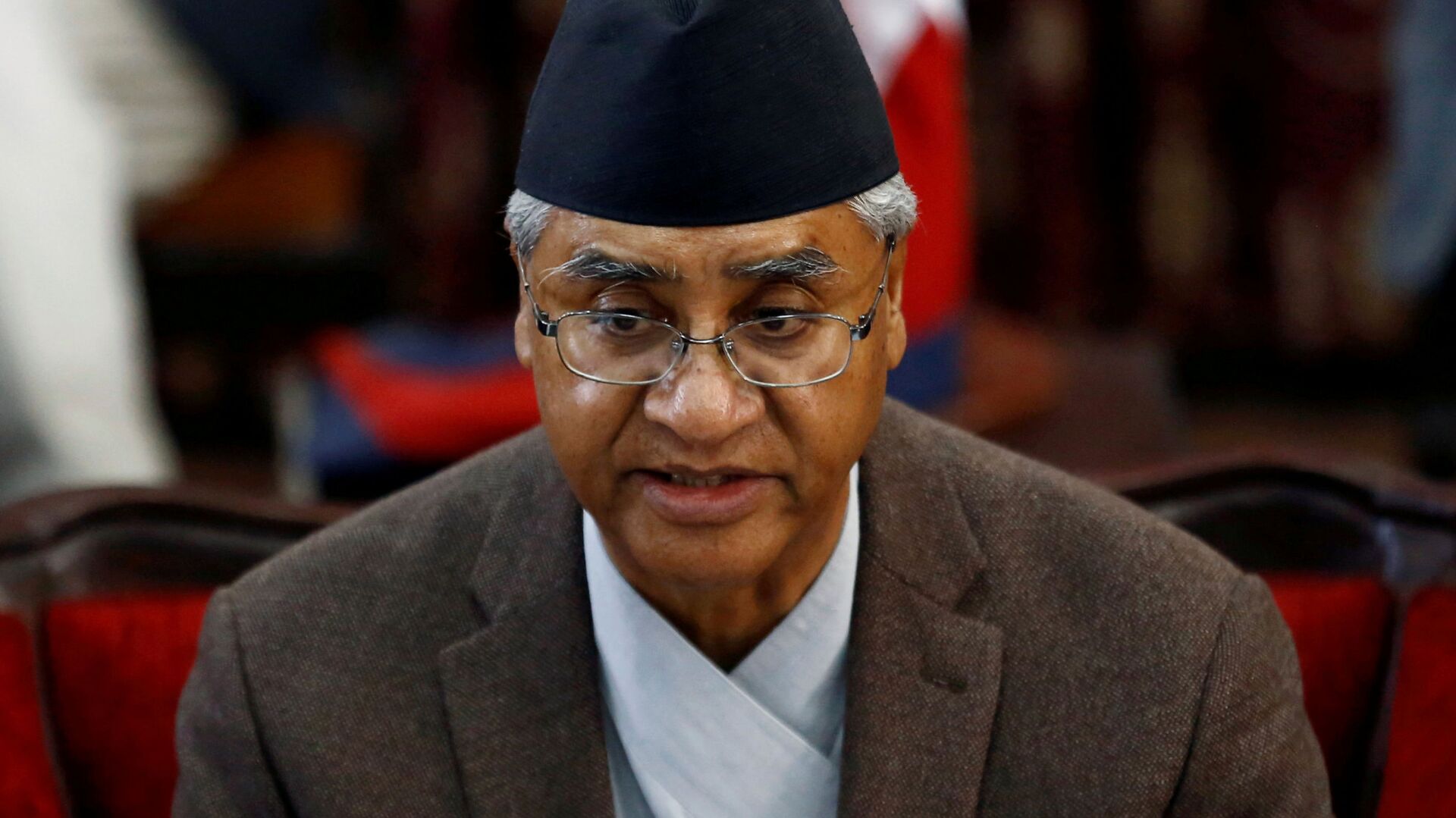https://sputnikglobe.com/20220216/nepals-govt-in-crisis-as-prachanda-threatens-to-quit-governing-coalition-over-us-backed-aid-pact-1093082661.html
Nepal's Gov’t in Crisis as Prachanda Threatens to Quit Governing Coalition Over US-Backed Aid Pact
Nepal's Gov’t in Crisis as Prachanda Threatens to Quit Governing Coalition Over US-Backed Aid Pact
Sputnik International
A US government-backed aid agency, the Millennium Challenge Corporation (MCC), signed a $500 million grant assistance compact in 2017 with Nepal. Several... 16.02.2022, Sputnik International
2022-02-16T14:16+0000
2022-02-16T14:16+0000
2022-07-19T10:42+0000
china
us
nepal
communist party of nepal (unified marxist-leninist)
communist party of nepal (maoist)
pushpa kamal dahal
sher bahadur deuba
millennium challenge corporation
indo-pacific
indian ocean
https://cdn1.img.sputnikglobe.com/img/07e5/07/0c/1083367754_0:229:2829:1820_1920x0_80_0_0_1e28c90ba2b9fa6be4adc209c28cb8b9.jpg
The Communist Party of Nepal (Maoist Centre) warned it would quit the government on Wednesday, hours before Prime Minister Sher Bahadur Deuba was supposed to table the Millennium Challenge Corporation-Nepal Compact in parliament.The $500 million grant is aimed at maintaining "road quality, increase the availability and reliability of electricity, and facilitating cross-border electricity trade between Nepal and India".Pushpa Kamal Dahal Prachanda, former prime minister and chairman of the CPN (Maoist Centre), has asked Deuba to form a consensus among coalition partners on the compact.Prime Minister Deuba is likely to meet with the coalition partners -- the Communist Party of Nepal (Maoist Centre), CPN (Unified Socialist), Janata Samajbadi Party, and Rastriya Janamorcha -- on Thursday afternoon to discuss the MCC.Local media widely reported that the US had given a deadline of 28 February to ratify the pact; otherwise, it would reconsider ties with the Himalayan state.Deuba, who came to power only in July last year, has assured the US that the pact will be ratified in parliament during the ongoing winter session.Coalition partners and the opposition believe the compact will undermine the country's constitution and that the US may use Nepal's soil against China under its Indo-Pacific Strategy.Last year, Sri Lanka also rejected an MCC agreement, as people believed it would compromise the nation's sovereignty and national security, forcing the US to discontinue a proposed $480 million development assistance programme in the island nation.The MCC has been dubbed a "development project aimed at poverty alleviation" by the US. Still, people in Asia consider it to be a tool to expand military outreach in the Indian Ocean.The MCC has partnered with nearly 30 countries worldwide on 38 grant agreements, totalling $13.5 billion.
china
nepal
indo-pacific
indian ocean
sri lanka
Sputnik International
feedback@sputniknews.com
+74956456601
MIA „Rosiya Segodnya“
2022
Rishikesh Kumar
https://cdn1.img.sputnikglobe.com/img/07e4/08/04/1080055820_0:0:388:389_100x100_80_0_0_40018ee210946d65d49ffba4f4c008e1.jpg
Rishikesh Kumar
https://cdn1.img.sputnikglobe.com/img/07e4/08/04/1080055820_0:0:388:389_100x100_80_0_0_40018ee210946d65d49ffba4f4c008e1.jpg
News
en_EN
Sputnik International
feedback@sputniknews.com
+74956456601
MIA „Rosiya Segodnya“
Sputnik International
feedback@sputniknews.com
+74956456601
MIA „Rosiya Segodnya“
Rishikesh Kumar
https://cdn1.img.sputnikglobe.com/img/07e4/08/04/1080055820_0:0:388:389_100x100_80_0_0_40018ee210946d65d49ffba4f4c008e1.jpg
china, us, nepal, communist party of nepal (unified marxist-leninist), communist party of nepal (maoist), pushpa kamal dahal, sher bahadur deuba, millennium challenge corporation, indo-pacific, indian ocean, sri lanka, aid, infrastructure, belt and road initiative
china, us, nepal, communist party of nepal (unified marxist-leninist), communist party of nepal (maoist), pushpa kamal dahal, sher bahadur deuba, millennium challenge corporation, indo-pacific, indian ocean, sri lanka, aid, infrastructure, belt and road initiative
Nepal's Gov’t in Crisis as Prachanda Threatens to Quit Governing Coalition Over US-Backed Aid Pact
14:16 GMT 16.02.2022 (Updated: 10:42 GMT 19.07.2022) A US government-backed aid agency, the Millennium Challenge Corporation (MCC), signed a $500 million grant assistance compact in 2017 with Nepal. Several political parties in the country consider the compact, which needs parliamentary approval for implementation, part of the US Indo-Pacific Strategy.
The Communist Party of Nepal (Maoist Centre) warned it would quit the government on Wednesday, hours before Prime Minister Sher Bahadur Deuba was supposed to table the Millennium Challenge Corporation-Nepal Compact in parliament.
"If the government tries to force it, now it is time for the government to break the alliance", Dev Prasad Gurung, the party's chief whip, warned as Deuba intended to table the $500 million US grant agreement on Wednesday.
The $500 million grant is aimed at maintaining "road quality, increase the availability and reliability of electricity, and facilitating cross-border electricity trade between Nepal and India".
Pushpa Kamal Dahal Prachanda, former prime minister and chairman of the CPN (Maoist Centre), has asked Deuba to form a consensus among coalition partners on the compact.
Prime Minister Deuba is likely to meet with the coalition partners -- the Communist Party of Nepal (Maoist Centre), CPN (Unified Socialist), Janata Samajbadi Party, and Rastriya Janamorcha -- on Thursday afternoon to discuss the MCC.
Local media widely reported that the US had given a deadline of 28 February to ratify the pact; otherwise, it would reconsider ties with the Himalayan state.
Last Thursday, US Assistant Secretary of State Donald Lu had phone conversations with Prime Minister Deuba and other coalition leaders. Lu reportedly warned that "the US would consider China's interest behind Nepal's failure to ratify the compact".
Deuba, who came to power only in July last year, has assured the US that the pact will be ratified in parliament during the ongoing winter session.
Coalition partners and the opposition believe the compact will undermine the country's constitution and that the US may use Nepal's soil against China under its Indo-Pacific Strategy.
The compact's Article 7.1 states: "The Parties understand that this Compact, upon entry into force, will prevail over the domestic laws of Nepal".
Last year, Sri Lanka also rejected an MCC agreement, as people believed it would compromise the nation's sovereignty and national security, forcing the
US to discontinue a proposed $480 million development assistance programme in the island nation.
The MCC has been dubbed a "development project aimed at poverty alleviation" by the US. Still, people in Asia consider it to be a tool to expand military outreach in the Indian Ocean.
The MCC has partnered with nearly 30 countries worldwide on 38 grant agreements, totalling $13.5 billion.




